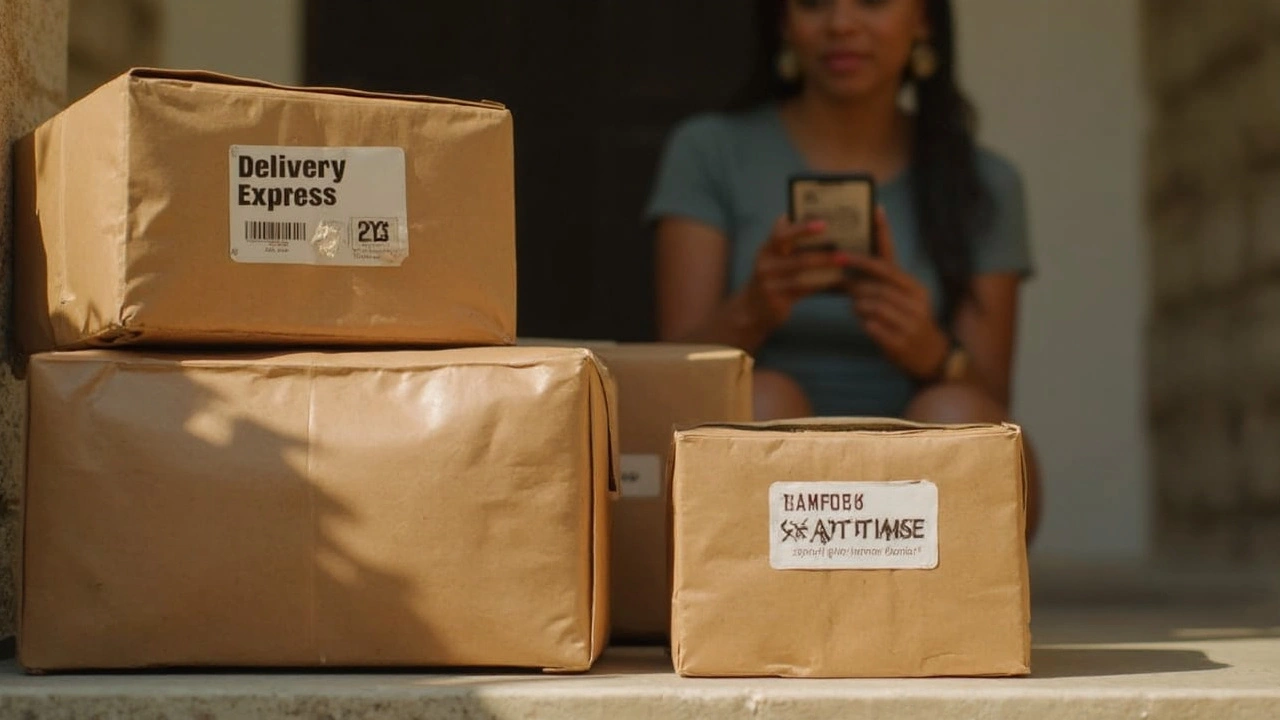Imagine waiting days for that package you ordered online, only to get a random text: 'Delivery Express has your parcel. Click here to reschedule delivery.' The link looks official enough. But is Delivery Express actually legitimate? Or is this the latest scam tricking people out of their money—or worse, their identity?
What Exactly Is Delivery Express?
Delivery Express popped onto a lot of people’s radars fast—thanks to a surge in e-commerce and the need for fast shipping. At its core, Delivery Express is the name used by several couriers and logistics companies, some officially registered, some less so. But here’s the thing: in the real shipping world, there isn’t one unified global company called “Delivery Express.” Instead, dozens of smaller, regional delivery services use the name. That’s where things get muddy. Legitimate delivery companies like FedEx, UPS, DHL, and USPS have years—sometimes decades—behind their reputation. Delivery Express, on the other hand, lacks that sort of brand recognition or established network. Some legit local operators do go by that name, especially in the U.S. for medical and business-to-business delivery, and they do a good job. But the lack of a single, official entity makes it really easy for scammers to piggyback off the term.
You’ll often see 'Delivery Express' on spammy emails and texts claiming you need to pay customs fees, reschedule a package, or log in to view a tracking update. The trick? Most people never checked if they were actually expecting a package!
Legitimate Delivery Express companies usually have an official website with clear contact info, verified reviews, and standardized tracking pages. If what you’re seeing looks sketchy or the website barely has any content or no physical address, that’s a red flag right there.
How Delivery Express Scams Work
Let’s get real about internet scams—they’re smart. The 'Delivery Express' ruse is one of the fastest-growing shipping scams right now. Scammers send messages pretending to be from a delivery service. They often say they couldn’t deliver your package or there’s an issue with the address. There’s usually a link telling you to pay a small fee or log in with your personal info. When you click, you might get malware installed on your phone or computer, or you’ll enter a phishing site designed to steal your credentials.
- The scam message often contains fake tracking numbers. If you google them, nothing pops up.
- They’ll try to spook you with urgent language: 'Your package will be returned unless you act now!'
- Some scams are sneaky enough to mimic the look of courier sites, using real company logos and colors—but the URL will be off by a letter or two.
- There’s usually a demand for money—sometimes just a couple of bucks, which most people pay without thinking.
Data from online fraud watchdogs shows that shipping-related scams spiked 34% in 2024, with 'Delivery Express' one of the fastest-growing keywords. Last winter, the BBB Scam Tracker recorded over 2,800 reports of fraudulent texts using ‘Delivery Express’ in just three months. That’s not a small number.
I can still remember when Cecilia got a text about a mystery package from ‘Delivery Express’ saying she owed $3.99. Did we buy something? Neither of us could remember. Then we checked the actual shipping emails from our last order—nothing matched up. We dodged that bullet by checking first.

Legit Delivery Express Companies: What To Look For
So, are there real companies called Delivery Express? Actually, yes. You’ll find several regional couriers by that name, especially in the U.S., dealing mostly in business delivery (medical supplies, legal docs, retail orders). But these companies tend to have a local reputation, customer service phone numbers, and an actual shipping history.
If you’re ever wondering if a Delivery Express message is legit, here’s how to check:
- Google the company. Do they have recent, real reviews and a functioning website?
- Check for specific details in tracking. Real tracking numbers actually work if entered on their official site.
- Look for a real contact phone number. Call and ask about your delivery.
- The email or text should have your name and specific package details—not just a generic 'Dear customer.'
- Payment links should go to secure sites (look for HTTPS in the browser bar).
- When in doubt, contact the sender of your package directly (like Amazon or the retailer you ordered from) to confirm which service is delivering.
If the message or website asks for a lot of unnecessary personal data up front—like your Social Security number or full date of birth—run the other way.
Legit Delivery Express companies usually work with commercial clients, not direct-to-home deliveries for random consumers. If you’re not expecting a delivery arranged by a business partner or employer, it’s probably not real.
How To Protect Yourself From Delivery Scams
With scams getting more sophisticated, you have to be proactive. Here are tried-and-true tips to keep you safe:
- Keep track of all your online orders. If a message claims you’re getting a parcel and you’ve ordered nothing, it’s a scam.
- Don’t click links in emails or texts from unknown senders. Visit the official delivery company website by typing it directly in your browser instead.
- Most official shipping updates include more than just a link—look for order numbers, your full name, and a clear sender email or phone number. Spam versions skip all that.
- If you ever receive a suspicious delivery notice, forward it to your country’s anti-fraud group, like the FTC in the U.S.
- Set up two-factor authentication on your email and shopping accounts.
- If you ever lose money through a scam, contact your bank right away. Fast reporting helps increase your chances of a refund.
- Install antivirus software on your devices—if you do click something suspicious, you want it caught fast.
Here’s a table on how to spot scam delivery texts—and what real ones look like:
| Fake Delivery Message | Genuine Delivery Message |
|---|---|
| Generic greeting ('Dear customer') | Uses your real name |
| Misspelled words/grammar mistakes | Clear, professional language |
| Strange URLs (e.g., deliverexpss.com) | Official company domain (e.g., ups.com) |
| Weird sender numbers/email | Shortcode or known company address |
This comparison is helpful when you’re not sure if that text is the real deal or just another phishing attempt.

The Bottom Line On Delivery Express: Legit Or Not?
So back to our burning question: is Delivery Express legit? Here’s the straight talk. Delivery express by itself isn’t a single, official courier you can always trust. Yes, some local companies with that name are real, reliable, and even used by businesses that need things delivered fast and locally. Those companies don’t usually serve random home consumers—and they won’t send you surprise texts for mystery packages you never ordered. On the flip side, fraudsters use the wide-open brand name to run endless scam campaigns, banking on the fact that people recognize the words 'delivery' and 'express'—but rarely take the time to check the details.
If you get a message from Delivery Express and you’re not expecting a shipment, stay skeptical. Do your homework. This stuff changes all the time: new scam sites pop up every day, and as fast as one discovery gets posted online, another two replace it. Even when you’re waiting on a real package, go directly to your order confirmation and only trust the tracking information provided by your retailer or shipper.
And honestly, a little bit of vigilance goes a long way. I’ve seen friends panic about fake customs fees, hundreds of dollars gone in the blink of an eye—all because the scam looked like every other package update they’d ever received. Don’t let a scammer be the last person handling your delivery.





